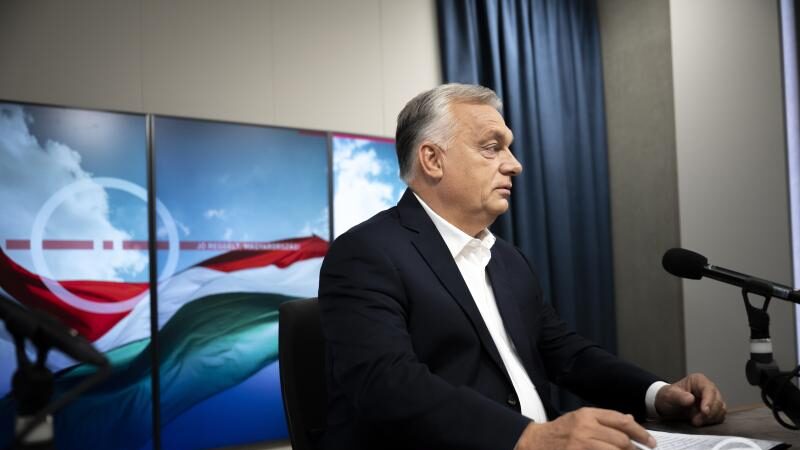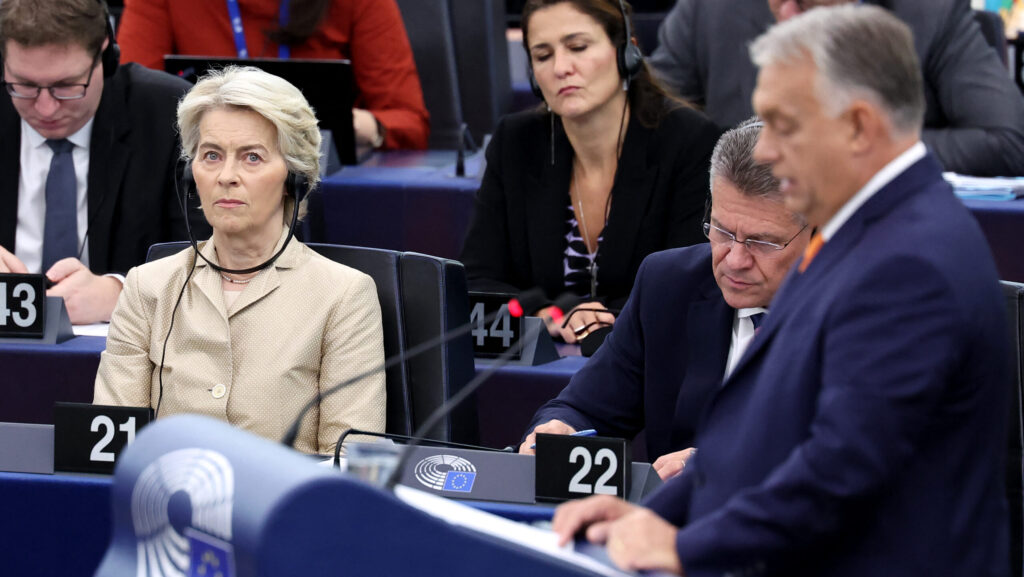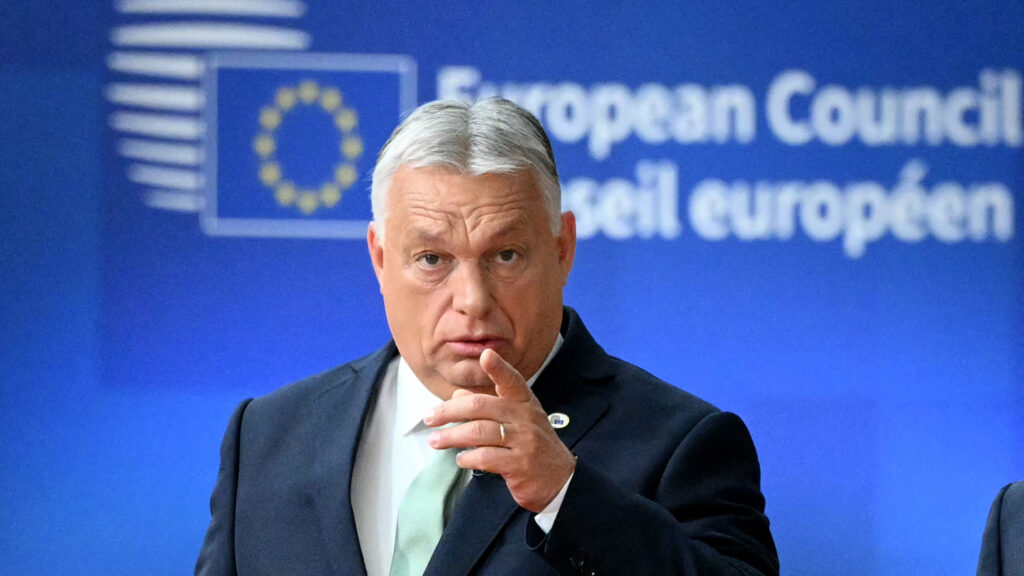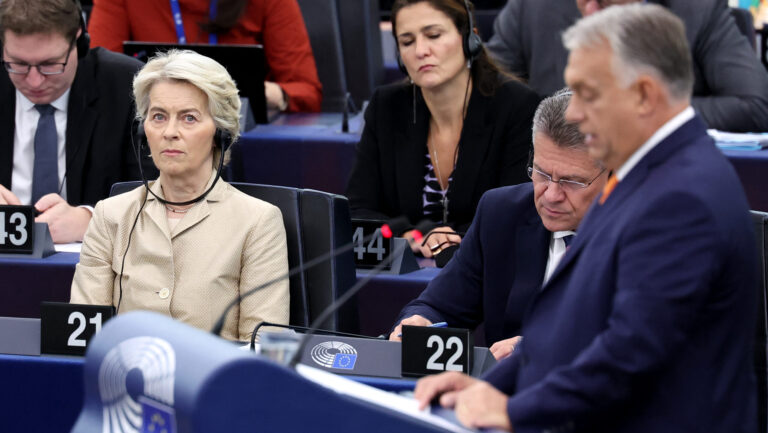During his regular Friday morning radio interview, Hungarian Prime Minister Viktor Orbán addressed Wednesday’s debate in the European Parliament, the priorities of Hungary’s EU Presidency, and the government’s economic measures aimed at sustaining economic growth and improving the living conditions of the Hungarian people.
Viktor Orbán stated that Wednesday’s debate following the presentation of Hungary’s EU Presidency programme to the European Parliament was ‘factually ignorant, filled with hatred, indifferent to Europe and its people, and solely focused on attacking.’ The prime minister argued that the debate was aimed at overthrowing the Hungarian government, with European Socialists seeking to replace it with Klára Dobrev, while the European People’s Party preferred the Tisza Party led by Péter Magyar.
Hungary Will Resist Brussels’ Plan
He added that these two parties have expressed their willingness to comply with Brussels’ demands: Hungary would be drawn into the war in Ukraine, supply arms and funds from its own budget, and support Brussels’ migration policy by allowing migrants to enter. Moreover, Hungary would be expected to dismantle its family and child protection laws and join the economic and trade war. Orbán warned that ‘Brussels wants to install the Socialist’s and the People’s Party’s representatives in the future Hungarian government to serve Brussels’ key objectives, which are the root causes of the current conflicts between Hungary and Brussels. This would mark the end of sovereign Hungarian politics and the imposition of a Brussels-controlled government.’
The prime minister described the Hungarian EU Presidency programme as well thought-out, of high quality, and an example of excellent professional work. He praised the efforts of the team working under the leadership of János Bóka, Minister for European Union Affairs. Orbán added that the European Parliament could have held a substantive debate on pressing issues, such as why the European economy is struggling, why American and Chinese companies are withdrawing from Europe, and the challenges posed by migration and the green transition.
‘This would mark the end of sovereign Hungarian politics and the imposition of a Brussels-controlled government’
Orbán remarked that those participating in the debate were in a frenzy. He noted that they were not interested in having a calm and intelligent discussion about Europe’s most pressing challenges; instead, they resorted to political bickering, antics, and disruptive behaviour, ‘ruining it for us.’ ‘When ten people come at you, that’s rock and roll—so it was rock and roll,’ Viktor Orbán commented.
He stated that Hungarians want to decide for themselves what kind of government they should have, based on their own programme and priorities. ‘We cannot allow people in Brussels to dictate how we should live and send their mercenaries to enforce it,’ he remarked, adding that Hungary has experienced such external interference before, when outsiders tried to impose their way of life. He warned that the ‘Brussels government set to be imposed on Hungary reeks of sweat—just like socialism and the Soviet Union.’ For this reason, he declared that Hungary will resist this Brussels plan.
He expressed confidence that Brussels will eventually accept this position because they will see that it is a battle they are losing. Public opinion, facts, and honesty do not support this type of Brussels agenda, he observed. ‘Our greatest allies are reality and transparency, and I will speak openly. If I am attacked, (...) I will present the facts and say: you are trading with the Russians,’ he asserted.
Orbán added that this is why Brussels will ultimately recognize that this approach is unsustainable and that it is time to return to normal European politics, respecting the autonomy of member states and leaving Hungary alone.
Hungary Must Focus On Itself
Regarding the proposals of the Hungarian EU Presidency, he stated that Hungary is advocating for the countries within the Schengen zone to convene at the highest level, first informally and then through a more institutionalised format, similarly to the approach taken during the summit on border protection and migration, which addressed the aftermath of the 2008 financial crisis.
He added that bypassing the European Commission this forum would decide on border protection matters, including how to prevent migrants from entering and how to monitor them. He assessed that Europe is undergoing a shift. It will take a bit more time, but eventually, a migration-opposing political line will be adopted, as people in Western Europe are increasingly dissatisfied with the current situation, and governments are beginning to face backlash over their handling of migration.
The prime minister also noted that there is little chance of finding a common EU solution to the competitiveness trap, as the positions are very far apart. ‘Therefore, Hungary must focus on itself, rather than Europe, despite holding the EU presidency,’ he stated.
He added that, for weeks, his focus had been solely on the Hungarian economy. ‘We have put together the first major action plan to give the Hungarian economy a new impetus,’ he stated, noting that he had reviewed these ideas with the head of the economic cabinet on Thursday. The measures being outlined include the creation of affordable housing, wage increases, and initiatives to support the expansion of small businesses.
Hungary’s New Deal
‘We will give a significant boost to the Hungarian economy, regardless of what Europe says. We will maintain economic neutrality, accepting from both the West and the East only what benefits Hungarians and rejecting anything that runs counter to our interests,’ Orbán stated, adding that this approach will result in 3-6 percent economic growth, which will be evident as early as next year. He noted that growth in the last two quarters of this year will be ‘somewhere between one and two percent,’ but next year, ‘we will see a substantial surge.’
He identified three key ‘intervention points’ for the plan: providing affordable housing, raising wages, and supporting small businesses.
Regarding housing, he promised that ‘there will be a significant housing boom,’ but added that ‘perhaps Budapest will finally take action’ on this issue, as the most pressing problems in this area are in the capital. ‘We have plans and are ready to negotiate,’ he stated, mentioning that the proposals include building dormitories and providing affordable housing for young people, potentially through rental schemes.
He added that the government will support housing construction in rural areas through the Hungarian Village Programme and will eliminate bureaucratic obstacles for individuals looking to use their savings to build homes.
Speaking on the second point of the package, Orbán noted that negotiations with trade unions are progressing well, expressing optimism that an agreement will be reached on both the minimum wage and the level of wage increases. He added that the goal of achieving an average salary of one million HUF in Hungary is not unrealistic. Additionally, he announced that a new ‘work loan’ would be introduced for vocational students, complementing the existing student loan system.
‘These measures will stimulate the Hungarian economy, and this will become very apparent in the first and second quarters of 2025’
Thirdly, he highlighted the government’s intention to support small entrepreneurs in scaling up, ‘who have been affected by inflation, war, sanctions, and Covid.’ He explained that, under the ‘Sándor Demján Programme,’ small and medium-sized enterprises would be provided with capital and soft loans to help them become more stable and grow. ‘Together, these measures will stimulate the Hungarian economy, and this will become very apparent in the first and second quarters of 2025. Until then, I will focus on this, and the Brussels people can deal with the consequences of their own policies,’ he remarked.
To implement these measures, he stressed, the Hungarian economy must generate resources through its own internal growth, while simultaneously reducing public debt and the budget deficit. ‘This is achievable. We have calculated it, we have planned it, and it is progressing well,’ he stated, noting that on Thursday the economy minister presented the figures, trends, and the overall concept. Based on this, a comprehensive government decision will soon be issued, outlining specific tasks, with concrete measures to follow in a week or two.
He added that the government would consult with stakeholders, economic operators, and, ultimately, the public to discuss these measures. ‘We want to create a kind of New Deal to invigorate the Hungarian economy,’ he remarked, noting that if a new economic policy is needed to adapt to a changing world, ‘then we need a New Deal.’
Related articles:







